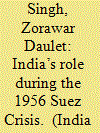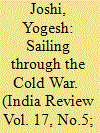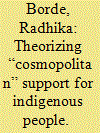| Srl | Item |
| 1 |
ID:
163316


|
|
|
|
|
| Summary/Abstract |
The 1956 Suez conflict was not inevitable. The involvement of an impartial third party had offered an exit ramp for the main protagonists. Largely forgotten today, India strove to reconcile the interests of the Westerns powers with Arab nationalism. Displaying creativity and perseverance in attempting to arrest the sudden deterioration in security in its extended neighborhood, India’s unceasing but responsible support for a weaker Arab state in the backdrop of determined Western coercion is a useful illustration for contemporary policymakers who are attempting to craft a sustainable approach towards a tumultuous West Asia. Using previously unused archival documents, this paper adds to the small literature on India’s involvement in this crisis by offering the first detailed account of India’s attempt to prevent the outbreak of hostilities in those fateful months of 1956. By doing so, this article also reveals interesting facets of India’s approach to conflict management and regional stability in the 1950s, a role that was predicated on not just promoting strategic restraint between antagonistic states but also enabling conflict resolution options that preserved the vital interests of competing actors.
|
|
|
|
|
|
|
|
|
|
|
|
|
|
|
|
| 2 |
ID:
163317


|
|
|
|
|
| Summary/Abstract |
It took approximately two decades for the Indian Navy to acquire submarines even when the first naval plan prepared by the Naval Headquarters in New Delhi and informally submitted to the British Admiralty in September 1947 contained an active submarine component. Other littoral navies in the Indian Ocean went for submarines much earlier. Using Indian, British, and U.S. archives, this article argues that the delay in India’s submarine arm was largely a result of the vagaries of the Cold War. Both Britain and the United States wanted the Indian Navy to contribute to the Western effort for a collective defense against the communist threat, which was largely conceived to be submarine based. This resulted in a surface heavy force structure. However, as India’s threat perceptions changed in 1960s, its quest for submarines gained momentum. When negotiations with the Western powers did not result in anything concrete, Indian Navy turned to the Soviets for initiating its own submarine arm. This decision had long-term implications for the Indian Navy as its underwater fleet thereafter remain dependent upon Soviet assistance for the rest of the Cold War.
|
|
|
|
|
|
|
|
|
|
|
|
|
|
|
|
| 3 |
ID:
163314


|
|
|
|
|
| Summary/Abstract |
This article presents a nuanced analysis of the role of the international support for a social movement in India, which became known as the Niyamgiri Movement. It uses the theory of normative cosmopolitanism to conduct the analysis. The Niyamgiri Movement was aimed at preventing the mining of a mountain which an indigenous community believed was sacred. The article advances theoretical insights into normative cosmopolitanism, and it also contributes to previous research on the Niyamgiri Movement in India that has not examined the role of its international supporters in sufficient detail. In the article, postcolonial scholar Gayatri Spivak’s theories are used to qualify the analysis of the international support for the Niyamgiri Movement in terms of normative cosmopolitanism. The concept of soft power is also discussed as an alternative theoretical lens, which could also be used to interpret the role of the governmental actors that supported the Niyamgiri Movement.
|
|
|
|
|
|
|
|
|
|
|
|
|
|
|
|